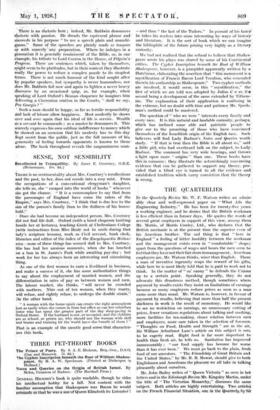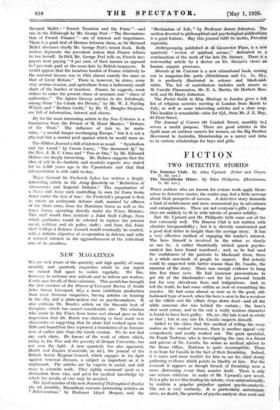THE QUARTERLIES
Ix the Quarterly Review Mr. W. F. Watson writes an admir-' ably clear and well-expressed paper on What Ails the' Engineering Industry." He has been for twenty-five years ' a working engineer, and he denies that the British workman iS less efficient than in former days. He quotes the words of- several great employers in support of this view, among them Mr. Morris, of Morris Cowley, Ltd., who declares that the' British mechanic is at the present time the superior even of_' his American brother. The sad thing is that " here in England " a feeling of bitter hostility between the workman' and the management exists even in " comfortable " shops; apart from the questions of wages and hours the men seem to feel that they have not their fair share in management. American employers are, Mr. Watson thinks, wiser than English. There a man of inventive ingenuity reaps the reward of his gifts; while here he is most likely told that he is paid to work not to think. In the matter of " ca' canny " he defends the Unions' up to a certain point. Speaking generally, they do not advocate this disastrous method, though sometimes where payment by results exists they insist on limitations of earnings because so many employers reduce prices as soon as a man earns more than usual. Mr. Watson is, however, in favour of payment by results, believing that more than half the present slackness in work is the result of monotony. He would like to see no restriction on earnings, no unnecessary cutting of prices, fewer vexatious regulations about talking and smoking; more facilities for tea-making, closer relation between men and employers, more care taken in the selection of foremen; " Thoughts on Food, Health and Strength " are in the air. Sir William Arbuthnot Lane's article on this subject is sure to be eagerly read. Right food is far more important to health than fresh air, he tells us. Sanitation has improved immeasurably ; " our food supply has become far worse than it has ever been." We must go back to the plain, fresh food of our ancestors. " The Friendship of Great Britain and the United States," by Mr. R. B. Mowat, should give to both Englishmen and Americans the pleasure we all take in talking
-pleasantly about ourselves. • • Mr. John Bailey writes of " Queen Victoria " as seen in her letters and-in the Edinburgh Review Mr. Kingsley Martin, under 'the title of " The Victorian Monarchy," discusses the same 'subject. Both articles are highly entertaining. Two articlei; 'on the French Financial Situation, one in the Quarterly, by Sir
Bernard Mallet—" French Taxation and the Franc "—and ope in the Edinburgh by Mr. George Peel—" The Reconstruc- tion of French Finance "—are of interest and importance. There is a good deal of likeness between them, as Sir Bernard Mallet discusses chiefly Mr. George Peel's recent book. Both writers deprecate the prevalent notion that France refuses to tax herself. In 1913, Mr. George Peel tells us, French tax- payers were paying " 9 per cent. of their income as opposed to 7 per cent. paid at the same date by British taxpayers. It would appear that the taxation burden of France relatively to the national income was in 1924 almost exactly the same as that of Great Britain." . There is, however, he states, some very serious evasion, and agriculture bears a ludicrously small share of the burden of taxation. France, he suggests, must reduce to order the present chaos of accounts and " chaos of authorities." The lighter literary articles in the Edinburgh, among them " La Cabale des Devots," by Mr. W. J. Payling Wright, and " Bodiam Castle," by Dr. W. Douglas Simpson, arc full of information, interest and charm.
il3y far the most interesting article in the New Criterion is a translation from the French of M. Henri Massis's " Defence of the West." The influence of Asia is, he main- tains, a mortal danger overhanging Europe," but it is not a physical but a mental peril against which he would warn us.
The Haber( Journal is full of interest as usual. " Symbolism and the Creed," by Canon Lacey, " The document Q," by the Rev. J. M. C. Crum and " Two or One," by Mr. Edmund Holmes are deeply interesting. Mr. Holmes suggests that the idea of self in its dualistic and monistic aspects was stated for us 2,500 years ago in the Upanishads and that that interpretation is, still valid to-day.
tlajor General Sir Frederick Sykes has written a deeply interesting article in the Army Quarterly on " Reduiction of Armaments and Imperial Defence." The organization of a Navy and Army each controlling its own Air Force broke down under the test of war : Sir Frederick's proposal is first- to create an embryonic. defence staff, manned by' officer& of the three arms, from the Dominion forces as well as the home forces, operating directly under the Prime Minister.. This staff would then institute a Joint Staff College, from which graduates would be selected to replace the present naval, military and air policy staffs and from this Joint Staff College a Defence Council would eventually be created, with a definite objective of co-operation in defence and with a reduced interest in the aggrandizement of the individual arm of its members.















































 Previous page
Previous page